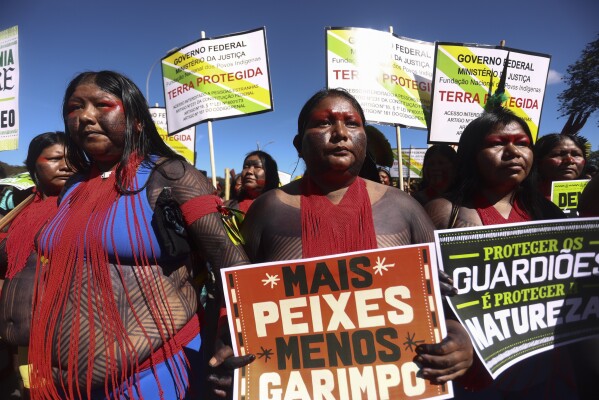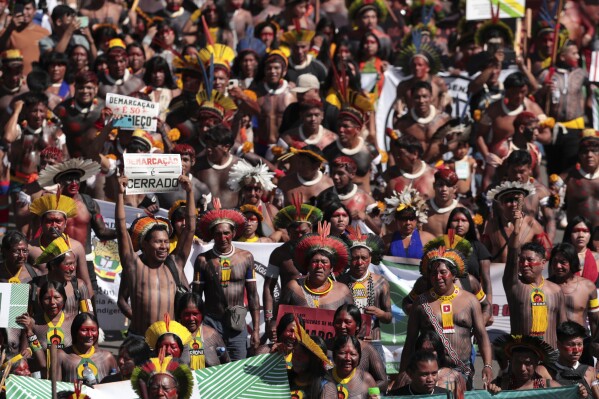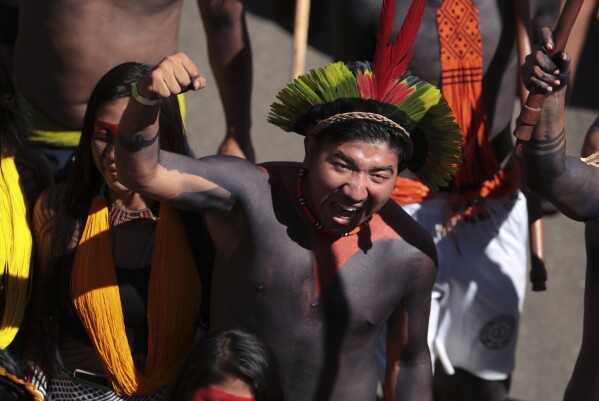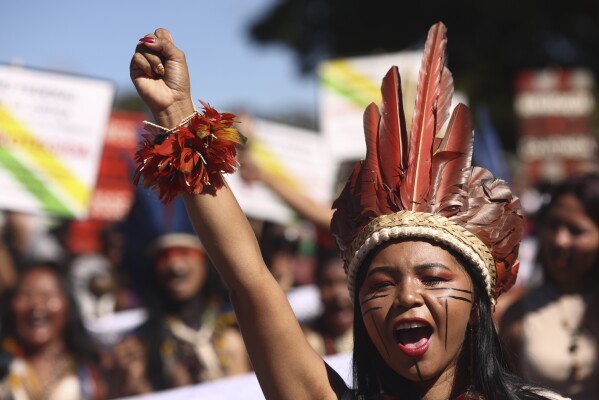Frustrated with Brazil’s Lula, Indigenous peoples march to demand land recognition

An Indigenous woman marches with a sign that reads in Portuguese “More fish, less mining,” during the 20th annual Free Land Indigenous Camp in Brasilia, Brazil, April 23, 2024. Thousands of Indigenous people continue to march on Thursday, April 25, calling on the government to officially recognize lands they have lived on for centuries and to protect territories from criminal activities like illegal mining.

Indigenous people march during the 20th annual Free Land Indigenous Camp in Brasilia, Brazil, Tuesday, April 23, 2024. Thousands of Indigenous people continue to march on Thursday, April 25, calling on the government to officially recognize lands they have lived on for centuries and to protect territories from criminal activities like illegal mining.

. (AP Photo/Luis Nova, File)Read More
BY FABIANO MAISONNAVE
April 25, 2024S
BRASILIA, Brazil (AP) — Thousands of Indigenous people marched on Thursday in Brazil’s capital, calling on the government to officially recognize lands they have lived on for centuries and to protect territories from criminal activities like illegal mining.
With posters bearing messages like, “The future is Indigenous,” they walked towards Three Powers Square, where Congress, the Supreme Court, and the Planalto presidential palace are located in Brasilia.
In addition to calls for more land recognition, some tribes protested a proposed 950-kilometer (590 miles) rail project to transport soybeans from the state of Mato Grosso, in the central part of the country, to ports along the Tapajos River, a large Amazon tributary.
Indigenous leaders from the Kayapo, Panará and Munduruku tribes said they hadn’t been adequately consulted and feared the new infrastructure would lead to increased deforestation.

An Indigenous woman marches during the 20th annual Free Land Indigenous Camp in Brasilia, Brazil, April 23, 2024. (AP Photo/Luis Nova)
Thursday’s rally marked the culmination of the annual Free Land Indigenous Camp, now in its 20th edition. This year’s gathering marked a critical view of President Luiz Inácio Lula da Silva’s administration. Unlike the two previous years, the president was not invited to visit the camp, set up in Brasilia’s main esplanade.
Previously president between 2003 and 2010, Lula began a third term in January of last year. Since then, his administration has created 10 Indigenous territories, which Indigenous leaders say is not enough. According to the non-profit Socio-Environmental Institute, at least 251 territories have pending claims for recognition before the federal government.
Indigenous territories comprise about 13% of Brazil’s territory. Most of these areas are in the Amazon rainforest.
___
An Indigenous woman marches with a sign that reads in Portuguese “More fish, less mining,” during the 20th annual Free Land Indigenous Camp in Brasilia, Brazil, April 23, 2024. Thousands of Indigenous people continue to march on Thursday, April 25, calling on the government to officially recognize lands they have lived on for centuries and to protect territories from criminal activities like illegal mining.
Indigenous people march during the 20th annual Free Land Indigenous Camp in Brasilia, Brazil, Tuesday, April 23, 2024. Thousands of Indigenous people continue to march on Thursday, April 25, calling on the government to officially recognize lands they have lived on for centuries and to protect territories from criminal activities like illegal mining.
. (AP Photo/Luis Nova, File)Read More
BY FABIANO MAISONNAVE
April 25, 2024S
BRASILIA, Brazil (AP) — Thousands of Indigenous people marched on Thursday in Brazil’s capital, calling on the government to officially recognize lands they have lived on for centuries and to protect territories from criminal activities like illegal mining.
With posters bearing messages like, “The future is Indigenous,” they walked towards Three Powers Square, where Congress, the Supreme Court, and the Planalto presidential palace are located in Brasilia.
In addition to calls for more land recognition, some tribes protested a proposed 950-kilometer (590 miles) rail project to transport soybeans from the state of Mato Grosso, in the central part of the country, to ports along the Tapajos River, a large Amazon tributary.
Indigenous leaders from the Kayapo, Panará and Munduruku tribes said they hadn’t been adequately consulted and feared the new infrastructure would lead to increased deforestation.
An Indigenous woman marches during the 20th annual Free Land Indigenous Camp in Brasilia, Brazil, April 23, 2024. (AP Photo/Luis Nova)
Thursday’s rally marked the culmination of the annual Free Land Indigenous Camp, now in its 20th edition. This year’s gathering marked a critical view of President Luiz Inácio Lula da Silva’s administration. Unlike the two previous years, the president was not invited to visit the camp, set up in Brasilia’s main esplanade.
Previously president between 2003 and 2010, Lula began a third term in January of last year. Since then, his administration has created 10 Indigenous territories, which Indigenous leaders say is not enough. According to the non-profit Socio-Environmental Institute, at least 251 territories have pending claims for recognition before the federal government.
Indigenous territories comprise about 13% of Brazil’s territory. Most of these areas are in the Amazon rainforest.
___
By AFP
April 23, 2024

Indigenous Brazilians from multiple groups march in Brasilia April 23, 2024 - Copyright AFP EVARISTO SA
Thousands of Indigenous people with colorful feathered headdresses and bows and arrows marched Tuesday in Brazil’s capital to demand the demarcation of their lands, an issue that pits a leftist president again a conservative-dominated congress.
One of President Luis Inacio Lula da Silva’s campaign pledges before taking power last year was to set boundaries for the traditional lands of Brazil’s 1.7 million Indigenous people, resuming a policy that his far-right predecessor Jair Bolsonaro had abandoned.
Scientists say Indigenous people are so good at preserving their land that demarcation helps protect the environment.
Lula so far has set up 10 new officially recognized Indigenous areas, but the demonstrators who were out Tuesday want him to do more.
“There is an Indigenous emergency,” Jaqueline Arandurah, a leader of the Kaiowa people in the southern state of Mato Grosso do Sul, told AFP.
“Lula has been in power more than 400 days and our lands have not been demarcated.”
Wearing their traditional dress, they filled a broad esplanade that houses many government ministries in Brasilia while others, some with their faces painted, marched on Congress, singing and dancing as part of an annual Indigenous land-rights festival.
Demarcating Indigenous lands is a touchy subject in Brazil, with critics in the powerful agro-business sector and its allies in Congress.
These lawmakers managed to keep on the books a controversial policy that the Supreme Court ruled unconstitutional. It holds that Indigenous people can lay claim to lands they were living on as of 1988, when the current constitution came into effect, but not before.
Indigenous people say this ignores their presence in these lands going back centuries.
The court threw out this policy in September of last year but will have to address the issue again as it is still part of the law.
“It is offensive to say were invaders, as we are not,” said Walderir Tupari of the Tupari people in the northern state of Rondonia.
“We have not been here only since 1988. We have been here a long, long time,” he added.
No comments:
Post a Comment